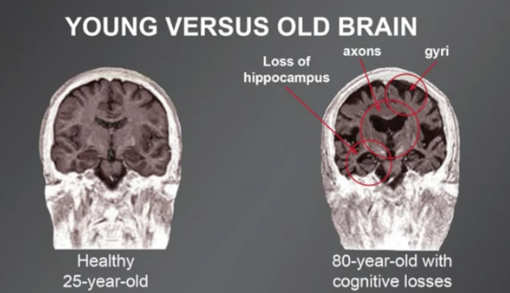There is a huge increase in brain size during the prenatal period and a rapid neurogenesis (up to 250 000 new neurons/min). Cells are migrating and neurons are differentiating.
Weight of newborns' brain is 25% of adult brain, but the size of the brain is only few percent smaller. During this stage the breast feeding is important for neurons myelinization (myelin is important for transferring signal between neurons without lost) and crying and the response to it will enable newborns and the brain to learn the reaction to the stimuli. The process of myelinization is one of the most important during next few months and it is also the reason why the weight of brain is increased from 25% after birth to 75% of adult weight in 3 years. Myelinization is very important process and it durates from approx. 2 months to 5-10 years (in some areas it last longer - for example for prefrontal cortex it continues up to 10 years). Different brain arreas attain its peak cortical thickness in different time. Averaged thickness of cortex is the highest around 10 years of age.
During this stage synapses are also rapidly generated. In adulthood there are about 100mld neurons and each of them can have approximatelly 1000 synapses. Synaptogenesis in areas responsible for seeing/hearing lasts from prenatal period up to 5 years, on the other hand in areas responsible for higher cognitive functions synapses can be created up to approx 20 years. However experienced-dependent synapses can be created during whole life.
Fig. 1 Thompson RA, Nelson CA 2001 Developmental science and the media: Early brain development. American Psychologist 56(1):5-15
Have you ever heard that there are no new neurons after birth? It is actually not true. Neurogenesis in hippocampus (important part of brain for transforming memories from short-term memory to long-term memory) proceeds up to 30 years and maybe longer. On the other hand after birth neurons are overpopulated and lot of them must die (it is a controlled process).
Hm, weight of brain after birth is comparable for women and men but then the weight is more increased for men :-(.
And now what about aging? I am not speaking about any neurodegenerative diseases. I speak about normal aging. What is actually happening with the brain?
Fig 2. (z webu: http://www.isagenixhealth.net/why-healthy-aging-starts-with-your-brain-webinar/)
The most important change is that cortex is getting thinner - primarily prefrontal cortex (planning, logical thinking etc.) and hippocampus (remembering). From the early adulthood the volume of the gray matter is lowered. This is very rapid in some areas while others seem to be nearly untouched until very high age (such as occipital lobe responsible for vision). White matter (composed of myelinated axons) is increased until 40 years and afterwards its volume is decreasing as well. Also some synapses are lost as well as plasticity (this is closely related to the usage of the brain). The reason for losing plasticity can be in problems with calcium regulation which is important for neural firing and transferring action potentials.
Morphology of neurons is also changed - they have smaller dendrites and their density and number of spins is 40% lower after 50 years compared to early adulthood. Whau thats a huge number, isn't it?
Another change - less number of neurotransmitters (dopamin, serotonin, glutamat...) which are important for communication among neurons. Also white matter is lost somewhere which I have mentioned above. Isn't it sad?
But it is not the end. Also aortas are thinner and less capillaries are created which changes blood supply to the brain (and less oxygen).
On the other hand the free radicals are accumulating (that are molecules which interacts easily with other molecules and are created during metabolism of mitochondrias when the oxygen is metabolised) which is called oxygenation stress. They can damage the cell membrane as well as DNA. This can be chain reaction (than it can cause Alzheimer disease).
And also DNA damages are accumulated.
Isn't it a sad story which is waiting for all of us? And I haven't mentioned several neurodegenerative diseases as Alzheimer, Parkinson, ALS etc.
Literatura
- http://www.zerotothree.org/child-development/brain-development/
- Stiles J, Jernigan TL. The Basics of Brain Development. Neuropsychology Review 2010;20(4):327-348. doi:10.1007/s11065-010- http://www.ncbi.nlm.nih.gov/pmc/articles/PMC2989000/
- Thompson RA, Nelson CA 2001 Developmental science and the media: Early brain development. American Psychologist 56(1):5-15
- The changing brain in healthy aging http://www.nia.nih.gov/alzheimers/publication/part-1-basics-healthy-brain/changing-brain-healthy-aging
- Aging brain - wiki http://en.wikipedia.org/wiki/Aging_brain
- Human brain development timeline - wiki http://en.wikipedia.org/wiki/Human_brain_development_timeline


Žádné komentáře:
Okomentovat